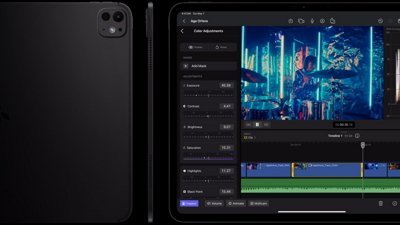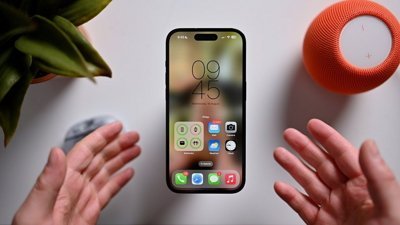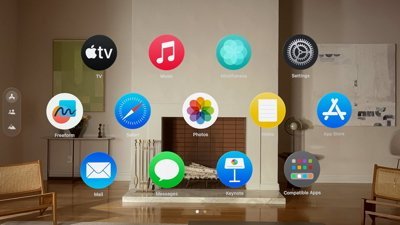US congressmen send letter to Apple inquiring about iOS address book security
Reps. G.K. Butterfield (D-N.C.) and Henry A. Waxman (D-Calif.) issued the letter to Cook on Wednesday, questioning whether Apple's iOS application developer policies and practices adequately protect consumer privacy.
The letter follows a controversy that arose earlier this month when social networking application "Path" was revealed to be uploading users' address books to its servers without asking for permission. The activity was discovered and publicized by developer Arun Thampi.
Last week, Path offered a public apology for its activities, and modified its software so that users could opt out of the address book upload. The company said the data was used to streamline the application's "Add Friends" feature, and not to collect sensitive information.
The letter from Waxman and Butterfield has requested Apple's response to nine questions. They pertain to user security and how Apple defines whether an application is suitable for users to download to their iPhone.
The government questioning is similar to a separate incident from last year, when a U.S. senator and congressman pushed Apple for answers about a location database controversy that arose. The issue gained attention after security researchers discovered a database file in iOS 4 that stored a large amount of location data representing cellular towers and Wi-Fi hotspots accessed by an iPhone.
Apple explained that the location database file was intended to improve location tracking services on the iPhone, but the size of the file grew to be large because of a programming glitch. The issue was quickly resolved with a software update.
The latest issue is not a result of a glitch in the iOS operating system, but a feature that Apple allows to developers that could potentially be abused. The congressmen are concerned that other applications are uploading users' address book information without their knowledge. The full letter is included below:
February 15, 2012
Mr. Tim Cook
Chief Executive Officer, Apple Inc.
1 Infinite Loop
Cupertino, CA 95014
Dear Mr. Cook:
Last week, independent iOS app developer Arun Thampi blogged about his discovery that the social networking app “Path†was accessing and collecting the contents of his iPhone address book without ever having asked for his consent. The information taken without his permission – or that of the individual contacts who own that information – included full names, phone numbers, and email addresses. Following media coverage of Mr. Thampi’s discovery, Path’s Co-Founder and CEO Dave Morin quickly apologized, promised to delete from Path’s servers all data it had taken from its users’ address books, and announced the release of a new version of Path that would prompt users to opt in to sharing their address book contacts.
This incident raises questions about whether Apple’s iOS app developer policies and practices may fall short when it comes to protecting the information of iPhone users and their contacts.
The data management section of your iOS developer website states: “iOS has a comprehensive collection of tools and frameworks for storing, accessing, and sharing data. . . . iOS apps even have access to a device’s global data such as contacts in the Address Book, and photos in the Photo Library.†The app store review guidelines section states: “We review every app on the App Store based on a set of technical, content, and design criteria. This review criteria is now available to you in the App Store Review Guidelines.†This same section indicates that the guidelines are available only to registered members of the iOS Developer Program. However, tech blogs following the Path controversy indicate that the iOS App Guidelines require apps to get a user’s permission before “transmit[ting] data about a userâ€.
In spite of this guidance, claims have been made that “there’s a quiet understanding among many iOS app developers that it is acceptable to send a user’s entire address book, without their permission, to remote servers and then store it for future reference. It’s common practice, and many companies likely have your address book stored in their database.†One blogger claims to have conducted a survey of developers of popular iOS apps and found that 13 of 15 had a “contacts database with millions of records†– with one claiming to have a database containing “Mark Zuckerberg's cell phone number, Larry Ellison’s home phone number and Bill Gates’ cell phone number.â€
The fact that the previous version of Path was able to gain approval for distribution through the Apple iTunes Store despite taking the contents of users’ address books without their permission suggests that there could be some truth to these claims. To more fully understand and assess these claims, we are requesting that you respond to the following questions:
1. Please describe all iOS App Guidelines that concern criteria related to the privacy and security of data that will be accessed or transmitted by an app.
2. Please describe how you determine whether an app meets those criteria.
3. What data do you consider to be “data about a user†that is subject to the requirement that the app obtain the user’s consent before it is transmitted?
4. To the extent not addressed in the response to question 2, please describe how you determine whether an app will transmit “data about a user†and whether the consent requirement has been met.
5. How many iOS apps in the U.S. iTunes Store transmit “data about a user�
6. Do you consider the contents of the address book to be “data about a user�
7. Do you consider the contents of the address book to be data of the contact? If not, please explain why not. Please explain how you protect the privacy and security interests of that contact in his or her information.
8. How many iOS apps in the U.S. iTunes Store transmit information from the address book? How many of those ask for the user’s consent before transmitting their contacts’ information?
9. You have built into your devices the ability to turn off in one place the transmission of location information entirely or on an app-by-app basis. Please explain why you have not done the same for address book information.
Please provide the information requested no later than February 29, 2012. If you have any questions regarding this request, you can contact Felipe Mendoza with the Energy and Commerce Committee Staff at 202-226-3400.
Sincerely,
Henry A. Waxman
Ranking Member
G.K. Butterfield
Ranking Member
Subcommittee on Commerce, Manufacturing, and Trade
cc: Dave Morin
Path, Co-Founder and CEO
 AppleInsider Staff
AppleInsider Staff












 Wesley Hilliard
Wesley Hilliard
 Mike Wuerthele and Malcolm Owen
Mike Wuerthele and Malcolm Owen
 William Gallagher
William Gallagher
 Amber Neely
Amber Neely

 Malcolm Owen
Malcolm Owen

 Andrew Orr
Andrew Orr








41 Comments
Clowns. F***** attention seeking clowns
if they really cared about address book security they should be looking into android and apps that send there data to china
Clowns. F***** attention seeking clowns
Pretty much. Did you see what they were requesting? They need to RTFM. They may have legitimate questions, but this is one ham-fisted way to go about it.
1) And yet without any security or accountability in place for Android they simply don't care unless it's regarding an Apple product. Android is winning¡
2) Apple really needs to make this an item in Settings like Location Data that shows you what apps have access to your Address Book or other sensitive parts of your personal info. While Path now asks you permission this should not be up to the developer but built-in protection from Apple. I blame Apple here.
3) Do they get full access to your Address Book, including notes because I put a lot of personal data into notes.
This is stupid. He should have written to Microsoft and Google instead.